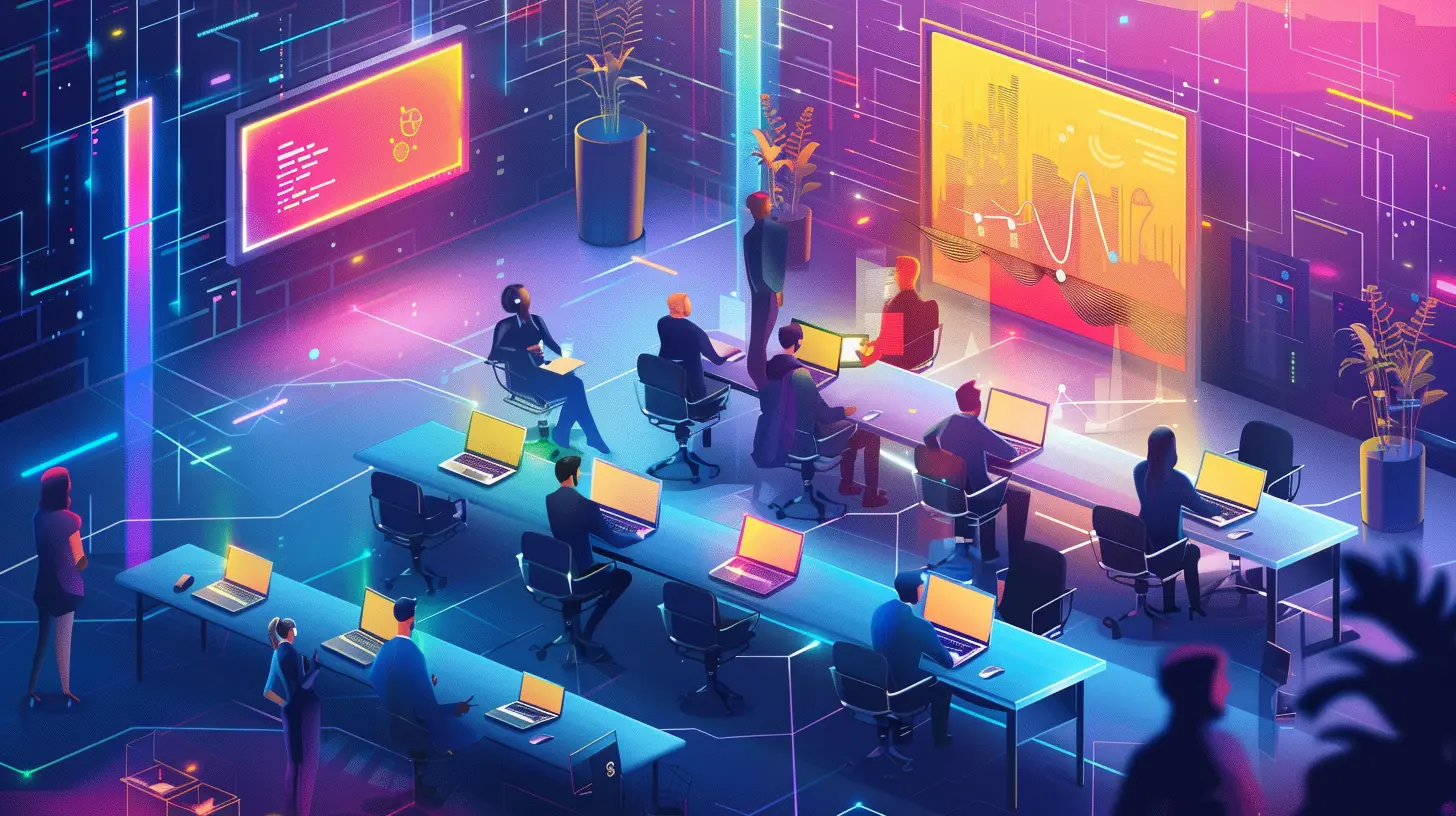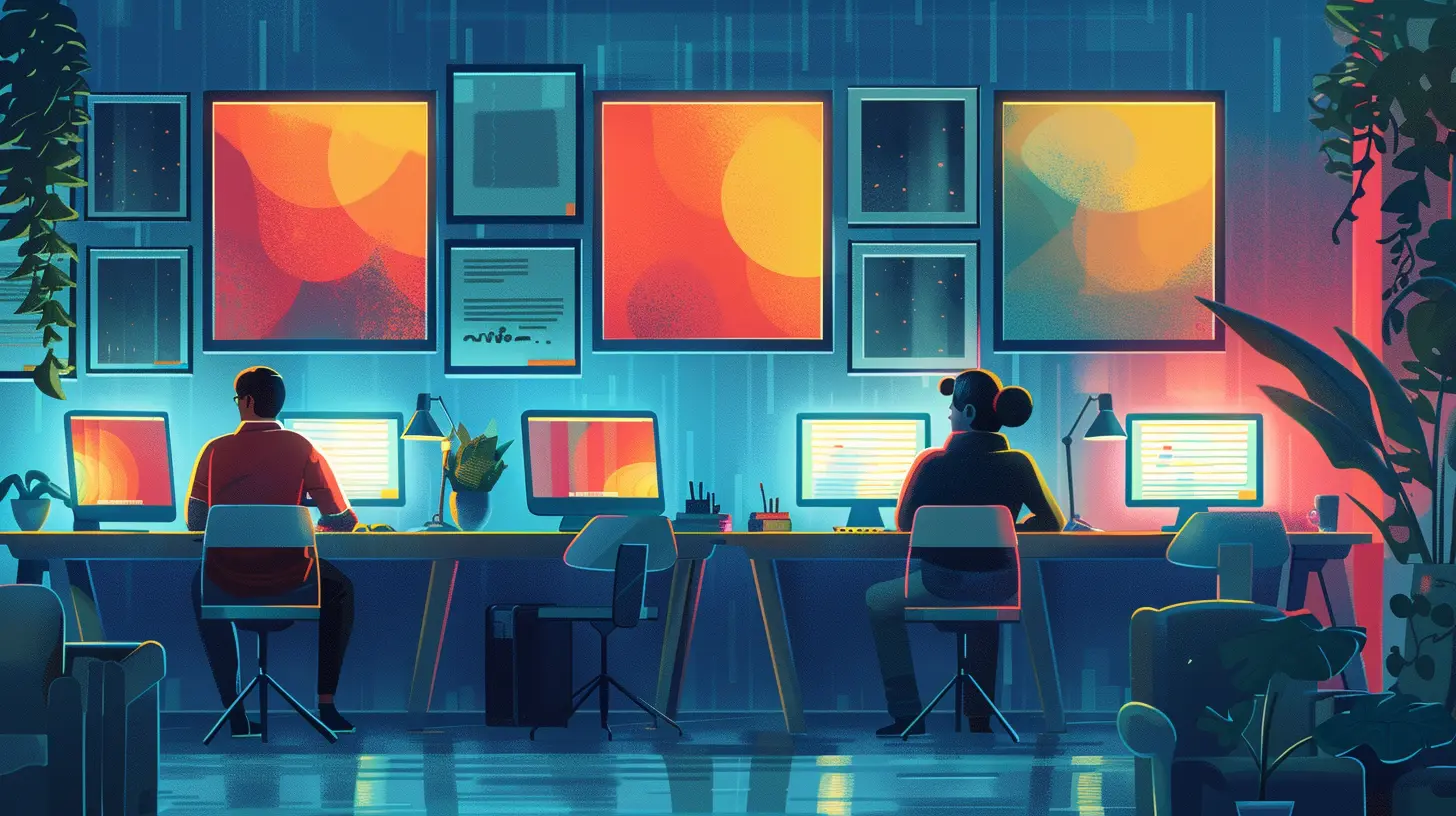The Future of Remote Innovation: How Decentralized Teams Fuel Creativity
13 December 2024
The way we work has changed—probably forever. The pandemic was the catalyst, launching remote work into the mainstream, but what came after was something far greater than just a "work-from-home" trend. Remote innovation—driven by the power of decentralized teams—is reshaping creativity and collaboration as we know it. It’s no longer about where you are; it’s about what you can do, who you can work with, and how diverse minds can connect like never before.
In this article, we’re diving deep into the future of remote innovation. Think of it as peeling back the layers of what makes decentralized teams the rockstars of creativity. So grab your coffee (or tea!), and let’s talk about why this shift in how we work is far more than just a temporary blip.
What Exactly Is Remote Innovation?
Before we get ahead of ourselves, let’s break this down. Remote innovation isn’t just about brainstorming ideas over Zoom. It’s the process of creating, problem-solving, and pushing boundaries without the constraints of a shared office space. Sounds liberating, right?Imagine this: It’s like baking a cake, but instead of one person handling all the steps in a single kitchen, you’ve got an expert in France making the icing, someone in New York baking the sponge, and another in Tokyo adding the decorations—all seamlessly collaborating. That’s remote innovation in a nutshell. 
Why Decentralized Teams Are the Future of Work
Let’s face it—times have changed. Gone are the days of everyone crowding into cubicles under fluorescent lights. Decentralized teams aren’t just a trend; they’re a necessity for businesses looking to thrive in a fast-paced and interconnected world. But why are these teams so dang effective?1. Diversity Breeds Creativity
Ever heard the phrase “two heads are better than one”? Multiply that by ten, throw in different cultures, languages, and areas of expertise, and you’ve got a recipe for creative breakthroughs.When you bring together people from diverse backgrounds, you get a variety of perspectives that challenge the status quo. Decentralized teams are like having a brainstorming session with a global think tank—ideas flow freely, and innovation becomes second nature.
2. Flexibility Supercharges Productivity
One of the coolest perks of working remotely is flexibility. People can work when they’re most productive, whether that’s during the wee hours of the morning or late at night. You’re no longer confined to a rigid 9-to-5 schedule, and guess what? Creativity doesn’t punch a time clock either.Think of it like watering plants. Some thrive in the morning sun, while others prefer the shade in the evening. The same goes for people—you let them work their way, and you’ll see them bloom.
3. Access to a Global Talent Pool
You’re no longer limited to hiring talent within a 30-mile radius of your office. Want to hire the best developer in Argentina? Or the most brilliant marketer in India? Go for it. Decentralized teams open the door to a global talent pool, giving businesses access to skills and ideas they might never have found otherwise.
The Tools That Make Remote Innovation Possible
If decentralized teams are the stars, then technology is the stage. Without the right tools, remote innovation would be like trying to bake that international cake without a shared kitchen. Let’s take a look at the must-haves that keep decentralized teams thriving.1. Collaboration Platforms
Think of platforms like Slack, Microsoft Teams, and Zoom as the virtual conference rooms of today. They allow team members to communicate seamlessly, no matter where they are in the world.2. Project Management Tools
Managing remote innovation requires structure, and that’s where tools like Asana, Trello, and Monday.com come in. They keep everyone on the same page, ensuring projects stay on track.3. File Sharing & Cloud Storage
Gone are the days of emailing documents back and forth. Platforms like Google Drive and Dropbox make it easy to share files and work collaboratively in real-time.4. AI-Powered Collaboration Tools
Let’s not forget the role of artificial intelligence. AI tools can now analyze team performance, predict project bottlenecks, and even provide suggestions to enhance workflow. It’s like having a virtual assistant that’s always got your back.
The Challenges of Decentralized Teams (And How to Overcome Them)
Let’s keep it real—remote innovation isn’t all rainbows and unicorns. Decentralized teams face their fair share of challenges, but the good news is, these hurdles are anything but insurmountable.1. Communication Gaps
When your team is spread across different time zones, communication can sometimes feel like a game of telephone. Misunderstandings happen, and it’s easy for things to slip through the cracks.Fix it: Use clear project guidelines, set expectations early, and lean on tools like Slack for quick updates. And seriously—don't underestimate the power of a good, old-fashioned video call.
2. Time Zone Differences
While it’s awesome to have a global team, coordinating meetings can feel like solving a Rubik’s Cube.Fix it: Rotate meeting times so the same group isn’t always inconvenienced. Plus, asynchronous communication (like recorded updates) can help bridge the gap.
3. Building Team Culture
Without the watercooler chats and office pizza parties, it can be tough to build relationships and maintain a strong team culture.Fix it: Prioritize virtual team-building activities. Whether it’s online trivia nights or Slack shoutouts for a job well done, fostering connection is key.
The Ripple Effect on Creativity
Here’s the thing: When you decentralize your team, you decentralize creativity. Ideas are no longer confined to one room or one city—they’re flowing across borders, time zones, and cultures.Innovation Becomes Democratic
In traditional office settings, creativity often flows top-down. But in decentralized teams, everyone has a seat at the table. When people feel empowered to share ideas, magic happens.Problem-Solving Gets a Makeover
With such a diverse range of perspectives, decentralized teams approach problems differently. What might seem like a roadblock to one person could be an opportunity for another. That’s the beauty of creative collaboration on a global scale.What the Future Holds for Remote Innovation
So, where is all this heading? If you ask me, we’re just scratching the surface. The future of remote innovation is all about pushing boundaries even further. Here are a few trends to keep an eye on:1. The Rise of Virtual Reality
Remember when VR was just for gaming? Not anymore. Virtual reality is poised to revolutionize how decentralized teams connect and collaborate, creating virtual offices and immersive brainstorming sessions.2. AI-Driven Innovation
AI won’t just help manage projects—it’ll play an active role in the creative process. We’re talking AI that can draft ideas, suggest improvements, and even collaborate alongside humans.3. Hyper-Specialization
As remote work continues to grow, we’ll likely see an increase in hyper-specialized roles. Teams will be built with experts handpicked from around the world, each contributing their unique skill set to fuel innovation.Wrapping It Up
Alright, so what’s the big takeaway here? Remote innovation and decentralized teams aren’t just the future—they’re the present. The ability to bring together diverse minds from across the globe, fueled by technology and a shared vision, is redefining what’s possible.Sure, there are challenges. But with the right tools, mindset, and approach, the opportunities far outweigh the obstacles. Whether you’re a business owner, team leader, or an everyday employee, embracing this new way of working could be the key to unlocking your most creative and innovative potential.
So, what do you think? Is your team ready to embrace the future of remote innovation? If you’re not already on board, it’s time to rethink how you work, because the decentralized revolution isn’t waiting around.
all images in this post were generated using AI tools
Category:
Innovation StrategyAuthor:

Ian Stone
Discussion
rate this article
17 comments
Iris Hardy
Remote innovation: where coffee breaks fuel creativity and pajamas become the new power suits—welcome to the future of brainstorming!
March 4, 2025 at 12:56 PM

Ian Stone
Absolutely! Remote work blends comfort with creativity, making every brainstorming session uniquely inspired. Embracing this shift can unlock limitless potential for decentralized teams.
Kassandra McCloud
This article brilliantly highlights how decentralized teams can enhance creativity and innovation, shaping the future of remote work effectively.
February 10, 2025 at 4:01 AM

Ian Stone
Thank you! I'm glad you found the article insightful. Decentralized teams truly have the potential to transform remote work and drive innovative solutions.
Mira Long
This article astutely highlights how decentralized teams can enhance creativity through diverse perspectives and collaboration. By leveraging technology, organizations can tap into global talent, fostering innovation in remote settings. Embracing this model not only drives creative solutions but also supports a more inclusive and dynamic workforce for the future.
January 27, 2025 at 1:28 PM

Ian Stone
Thank you for your insightful comment! I completely agree that decentralized teams can significantly enhance creativity and drive innovation through diverse perspectives and collaboration. Embracing this model is indeed key to shaping a more inclusive workforce.
Harmony McGill
This article brilliantly highlights how decentralized teams can foster innovation by leveraging diverse perspectives and skills. Embracing remote collaboration not only enhances creativity but also positions businesses to adapt swiftly in a dynamic marketplace.
January 23, 2025 at 12:18 PM

Ian Stone
Thank you for your insightful comment! I'm glad you found the article highlights on the benefits of decentralized teams and remote collaboration valuable.
Antonia Hernandez
This article brilliantly highlights the transformative potential of decentralized teams in driving remote innovation. By leveraging diverse perspectives and fostering an inclusive culture, organizations can unlock unprecedented creativity. Embracing flexible collaboration models will be key to navigating future challenges and capitalizing on the vast opportunities that lie ahead.
January 20, 2025 at 9:59 PM

Ian Stone
Thank you for your insightful comment! I'm glad you found the article resonates with the potential of decentralized teams in driving innovation and creativity. Embracing inclusivity and flexible collaboration truly is essential for future success.
Martha Maddox
This article highlights the transformative power of decentralized teams in driving remote innovation. Embracing diverse perspectives fosters creativity and collaboration, proving that geographical boundaries no longer limit our ability to innovate. Excited to see how this trend continues to shape the business landscape!
January 15, 2025 at 4:52 AM

Ian Stone
Thank you for your insightful comment! I'm glad you resonated with the article's message about the power of decentralized teams in driving creativity and innovation. It's an exciting time for remote collaboration!
Phaedra McGuffin
This article insightfully highlights the transformative power of decentralized teams in driving remote innovation. By leveraging diverse perspectives and flexible collaboration, organizations can enhance creativity and adaptability. Embracing this model not only strengthens problem-solving capabilities but also fosters a dynamic work culture that attracts top talent.
January 9, 2025 at 8:42 PM

Ian Stone
Thank you! I'm glad you found the article insightful. Decentralized teams truly hold immense potential for fostering creativity and innovation in our evolving work landscape.
Rhett Lawson
In distant realms, ideas intertwine, Decentralized dreams spark innovation's shine. Together apart, creativity flows; A bright future in unity grows.
January 4, 2025 at 7:39 PM

Ian Stone
Thank you for capturing the essence of our article! Indeed, decentralized teams create a rich tapestry of ideas that drives innovation and fosters creativity.
Dana McInerney
What a fantastic read! Embracing decentralized teams truly unlocks innovative potential and creativity. It's inspiring to see how remote collaboration is shaping the future of innovation in such an exciting way! Keep shining!
January 1, 2025 at 7:41 PM

Ian Stone
Thank you! I'm thrilled you found it inspiring. Embracing decentralized teams really is key to unlocking our collective creativity!
Selena Lopez
Great insights! Embracing decentralized teams truly sparks creativity and innovation in our ever-evolving work landscape.
December 29, 2024 at 4:05 AM

Ian Stone
Thank you! I'm glad you found the insights valuable. Embracing decentralized teams is indeed key to unlocking new levels of creativity and innovation!
Quorra Franco
Remote innovation isn’t just a trend; it’s the new norm! Decentralized teams unlock a treasure trove of creativity by breaking down the dull walls of traditional office life. If your team isn’t embracing this shift, you’re just hitching a ride on yesterday’s ideas. Get with the program!
December 23, 2024 at 9:19 PM

Ian Stone
Absolutely! Embracing decentralized teams not only fosters creativity but also positions us at the forefront of innovation. It’s time to adapt and thrive in this new landscape!
Zylith Flores
Embracing decentralized teams is the key to unlocking creativity in our rapidly evolving landscape. By leveraging diverse perspectives and fostering collaboration, we can drive innovation like never before. Let's harness the power of remote work to inspire fresh ideas and shape a brighter future together!
December 18, 2024 at 5:35 AM

Ian Stone
Thank you for your insightful comment! I completely agree—decentralized teams truly enhance creativity and drive innovation by bringing together diverse perspectives. Embracing remote work is indeed essential for shaping a brighter future.
Maddox Morrow
Decentralized teams harness diverse perspectives, fostering innovation in remote environments. Embracing flexible collaboration not only enhances creativity but also drives adaptability—a crucial asset in today’s dynamic market landscape.
December 15, 2024 at 12:26 PM

Ian Stone
Thank you for your insightful comment! I completely agree—diverse perspectives and flexible collaboration are indeed key to driving innovation and adaptability in remote teams.
Cerys Coffey
Decentralized teams are the wildcards of creativity—no office walls to stifle those genius ideas! Let’s face it: innovation thrives outside the box (or cubicle). If you’re still clinging to old-school structures, it’s time to wake up and smell the remote revolution!
December 14, 2024 at 12:21 PM

Ian Stone
Absolutely! Decentralized teams unleash creativity by breaking down traditional barriers, fostering an environment where innovative ideas can flourish. Embracing this shift is crucial for driving future innovation.
Carla McCool
This article sparks fascinating questions! How do decentralized teams maintain synergy and creativity? Are there specific tools or strategies that enhance collaboration across diverse locations? Excited to explore this further!
December 14, 2024 at 4:45 AM

Ian Stone
Thank you for your enthusiasm! Decentralized teams can maintain synergy through regular communication, shared digital workspaces, and collaborative tools like Slack, Miro, and Zoom. Emphasizing a strong culture of trust and inclusivity also fosters creativity across diverse locations. Looking forward to your insights!
Desiree Lamb
Decentralized teams enhance creativity through diverse perspectives.
December 13, 2024 at 12:30 PM

Ian Stone
Absolutely! Decentralized teams leverage diverse perspectives, sparking innovative ideas and enhancing creativity in remote environments.
Mitchell McClary
Innovation thrives in diverse environments; remote teams ignite creativity!
December 13, 2024 at 5:08 AM

Ian Stone
Absolutely! Diverse perspectives in remote teams can spark unique ideas and drive innovative solutions.
MORE POSTS

Turning Market Volatility into Strategic Opportunities

Boosting Employee Efficiency in the Digital Age

Corporate Social Responsibility and the Evolving Consumer Expectations

Unlocking Growth: The Role of Innovation in Future-Proofing Your Business

Creating a Clear Path from Customer Insight to Action

Balancing Innovation with Operational Efficiency in Strategy

Understanding Shipping and Fulfillment Options for E-Commerce

How Market Trends Can Impact Your Long-Term Financial Plan

Greenwashing vs. Genuine CSR: How to Tell the Difference

The Intersection of Ethics and Management: A Framework for Success

Empowering Employees Through Effective Leadership